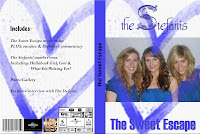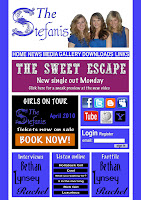1. In what ways does your media product use, develop or challenge forms and conventions of real media products?
In the production of my final piece, I aimed to incorporate certain music conventions into both my main product, as well as ancillary texts. In particular, the Digipack and Webpage are laid out in a similar way to competing products, targeted at the female teenage audience, and also include conventional features. For example, in the Digipack insert I have included photographs of both the group as a whole, and individual shots as well as featuring the lyrics. On the DVD itself, the video, its outakes, and a photo gallery are featured, and I would also have liked to include a director's commentary and interview with the group. The Webpage is linked to the Digipack in terms of colour and photography. Conventionally, it includes notifications about new media and tours, interviews, factfiles and links to fanbases on other sites.


Whilst throughout the creation of the Digipack and Webpage I predominantly made use of conventions, in the music video itself I tried to be more original, through developing and challenging conventions. The video is quite abstract, with a wide range of locations and costumes. Whilst this inevitably made the narrative hard to follow, it also makes it more interesting, as the video constantly moves on and changes, rather than returning to the same images, as many music videos do. In the research presented on the blog, I tried to analyse a broader range of genres, in order to help me decide what kind of video I wanted to make. Once I had chosen "The Sweet Escape" with a female teenage audience, I used television music channels to watch a range of music videos with a similar target audience. I found that in general there were two main styles of music video, for this audience; those with a strong narrative, based around a story told through the lyrics, and those based on dancing and performance.
With this in mind, I chose to combine the two styles, whilst also considering the style of the Gwen Stefani's actual video for the song, and her other music. As displayed on the blog, I found that most of Gwen Stefani's music videos were based around some form of intertextual concept. For example in her video for The Sweet Escape, intertextual references to Rapunzel are made in relation to the escape or rescue elements in the lyrics. Based on these ideas I created a video with both narrative and performance based elements, which were each visualised or referred to at different points in the video. I also tried to create an abstract feel to the video, which complimented the varying stylistic features.
2. How effective is the combination of your main product and ancillary texts?
The webpage and Digipack combine and compliment each other with ease due to colour coordination, whereas my main product stands out as a more abstract piece. The combination of the ancillary texts forms an easily identifiable brand for the audience. However, the abstract style of the video compliments this as it gives audiences a better insight into the individual personalities of the group. Both elements here are important, a brand must be maintained for audience recognition, but a deeper understanding encourages fandom.
3. What have you learned from your audience feedback?
In earlier audience feedback, mid-way through the creation of the music video, I found that one of my original conceptual ideas was not being represented strongly enough in the video. In light of my research of intertextual references used in Gwen Stefani's videos, I tried to incorporate a good and bad theme in my video. With Lynsey (the brunette) as the main singer, and Rachel and Bethan as good and bad, a sort of angel and devil theme. This idea was given a modern twist through the use of angelic, pretty costumes for Rachel, and glamourous, rebellious costumes for Bethan.
However, through audience feedback it was clear that this concept was not effectively presented, and whilst my focus group were able to identify the idea once I had told them about it, it was not something they immediately picked up on themselves. Luckily this issue was identified fairly early on in the filming process and I was therefore able to film different scenes where the group could be film as a whole, and dressed to fit as a group, rather that as different characters. As it turned out, I am pleased with the effect the two different styles give; one showing off their individual personalities, and the other presenting them as a group, and as friends.
4. How did you use media technologies in the construction and research, planning and evaluation stages?
In the production of the music video, I used a digital camera to film the required footage. This was then uploaded into iMovie, where I learnt how to edit with the precision required to lip sync, which was particularly difficult. This was a long process, and at different stages, further footage was recorded and uploaded, and edited into the video. With my final cut ready, I exported it into iDVD where I created a Digipack DVD package, with a menu allowing users to find extra footage and features. I did this simply through trial and error and 'playing around' with the different functions of iDVD. From iMovie, I also created an outakes video full of funny scenes from the unwanted footage.
To create the cover and insert for the Digipack I used Photoshop. Here, once I had taken my photographs, I was able to work relatively quickly and with ease due to prior experience with Photoshop from the Preliminary and Main Tasks created last year, as well as my GCSE work. I also carefully edited the individual photographs before adding them to the layout of the digipack pages. The Website was also created on Photoshop, using photographs from the same shoot, to tie it together with the digipack.
In the research and planning stages, I was able to gain some knowledge of how to use iMovie through the creation of an Animatic, and Mood Board. In particular, the Mood Board used very specific music timings and cuts, but these were of course, just of stills. In the early stages, I used the embed feature on blogger to link to videos on YouTube. I then created some PowerPoints and presented these on the blog through slideshare. Use of methods such as these helped to link ideas together and made my blog more interactive.













